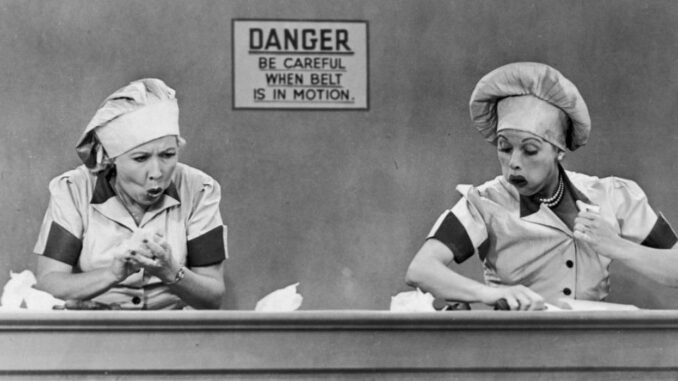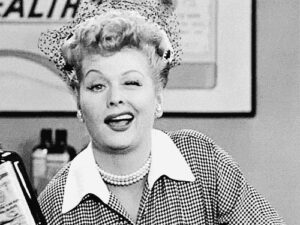
Why I Love Lucy Was So Influential
“I Love Lucy” isn’t just a classic sitcom; it’s a cultural cornerstone that redefined television forever. Whether you’re a casual fan or a TV history buff, the show’s impact is impossible to ignore. From groundbreaking production techniques to its trailblazing star, Lucille Ball, this show left an indelible mark on the entertainment industry. Let’s explore why “I Love Lucy” remains one of the most influential television shows of all time.
The Beginnings of a TV Revolution
The Genius of Lucille Ball
Lucille Ball wasn’t just the star of the show; she was its heart and soul. Her comedic timing, physical humor, and charisma set a new standard for TV performances. Ball wasn’t afraid to be silly, vulnerable, or outrageous—all while staying relatable to audiences.
A Perfect On-Screen Pairing
Desi Arnaz, Ball’s real-life husband, played Ricky Ricardo, creating an electric dynamic that mirrored their off-screen chemistry. Their partnership was groundbreaking, showcasing a multiethnic marriage during a time when such representations were rare.
The Groundbreaking Production Techniques
The Birth of the Multi-Camera Sitcom
“I Love Lucy” was one of the first shows to use a multi-camera setup with a live studio audience. This innovation allowed for seamless editing and genuine audience reactions, which added to the show’s authenticity.
Filming in Front of a Live Audience
Unlike many shows of its time, “I Love Lucy” embraced the energy of a live audience. The laughter you hear is real, giving the show a unique, vibrant atmosphere.
Syndication Pioneer
The show was one of the first to be recorded on film, paving the way for reruns and syndication. This decision ensured that “I Love Lucy” could reach future generations, cementing its legacy.
Trailblazing Representation
A Multiethnic Marriage on TV
Desi Arnaz’s role as Ricky Ricardo broke barriers, portraying a Cuban-American in a positive light. Their marriage wasn’t just a plot device; it was a celebration of love transcending cultural differences.
Strong Female Lead
Lucille Ball’s portrayal of Lucy Ricardo gave audiences a female lead who was ambitious, funny, and flawed. She shattered the mold of women being relegated to secondary roles, inspiring countless actresses to follow in her footsteps.

Cultural Impact and Legacy
Redefining Comedy
The show’s humor wasn’t just slapstick; it was smart, situational, and character-driven. Lucy’s schemes and mishaps remain timeless, influencing sitcoms for decades.
Setting Ratings Records
“I Love Lucy” dominated ratings, becoming the first show to attract over 10 million viewers. Its widespread popularity demonstrated the power of television as a medium.
Merchandising and Branding
From “I Love Lucy” dolls to themed lunchboxes, the show was one of the first to capitalize on merchandise, proving its appeal extended beyond the screen.
Iconic Episodes That Shaped TV
The Chocolate Factory Scene
Who could forget Lucy and Ethel frantically stuffing chocolates into their mouths? This iconic scene became a symbol of comedic perfection.
Vitameatavegamin
Lucy’s hilarious attempt to film a commercial while getting increasingly inebriated on the product remains one of the funniest moments in TV history.
Lucy Meets Superman
This episode showcased the show’s ability to blend humor with heartfelt moments, as Lucy’s antics brought Superman himself to her son’s birthday party.
Behind-the-Scenes Brilliance
Desilu Productions
Lucille Ball and Desi Arnaz’s production company, Desilu, didn’t just produce “I Love Lucy”; it became a powerhouse that brought us classics like “Star Trek” and “The Untouchables.”
Breaking Gender Barriers
Lucille Ball became the first woman to run a major television studio, proving her influence extended far beyond acting.
Why It Still Resonates Today
Timeless Humor
The humor in “I Love Lucy” transcends generations. Its clever writing and physical comedy continue to make audiences laugh.
Relatable Themes
Whether it’s juggling work and family, pursuing dreams, or navigating relationships, the show’s themes remain universally relatable.
A Blueprint for Modern Sitcoms
From “Friends” to “The Office,” modern sitcoms owe a debt to “I Love Lucy” for setting the gold standard in storytelling and character development.
Lessons Learned from ‘I Love Lucy’
Innovation Pays Off
By taking risks, like introducing the multi-camera setup, the show proved that innovation could lead to lasting success.
Representation Matters
The show’s celebration of diversity and strong female leadership remains a model for inclusivity in entertainment.
Laughter is Universal
At its core, “I Love Lucy” reminds us that humor can bridge cultural and generational gaps, uniting audiences worldwide.
Conclusion
“I Love Lucy” isn’t just a TV show; it’s a cultural phenomenon that changed the way we create and consume entertainment. From its innovative production techniques to its groundbreaking representation, the show’s influence is still felt today. Whether you’re laughing at Lucy’s antics or marveling at its trailblazing achievements, there’s no denying its enduring legacy.
FAQs
1. Why was ‘I Love Lucy’ so innovative?
The show introduced the multi-camera setup, live audience filming, and syndication, revolutionizing TV production.
2. What made Lucille Ball a trailblazer?
Lucille Ball was the first woman to run a major TV studio and redefined the role of women in entertainment with her iconic performance.
3. How did ‘I Love Lucy’ influence modern sitcoms?
It set the standard for situational comedy, character-driven humor, and innovative storytelling techniques.
4. Why is ‘I Love Lucy’ still popular today?
Its timeless humor, relatable themes, and pioneering achievements continue to resonate with audiences.
5. What were some iconic moments from the show?
Memorable scenes include the Chocolate Factory episode, Vitameatavegamin commercial, and Lucy meeting Superman.